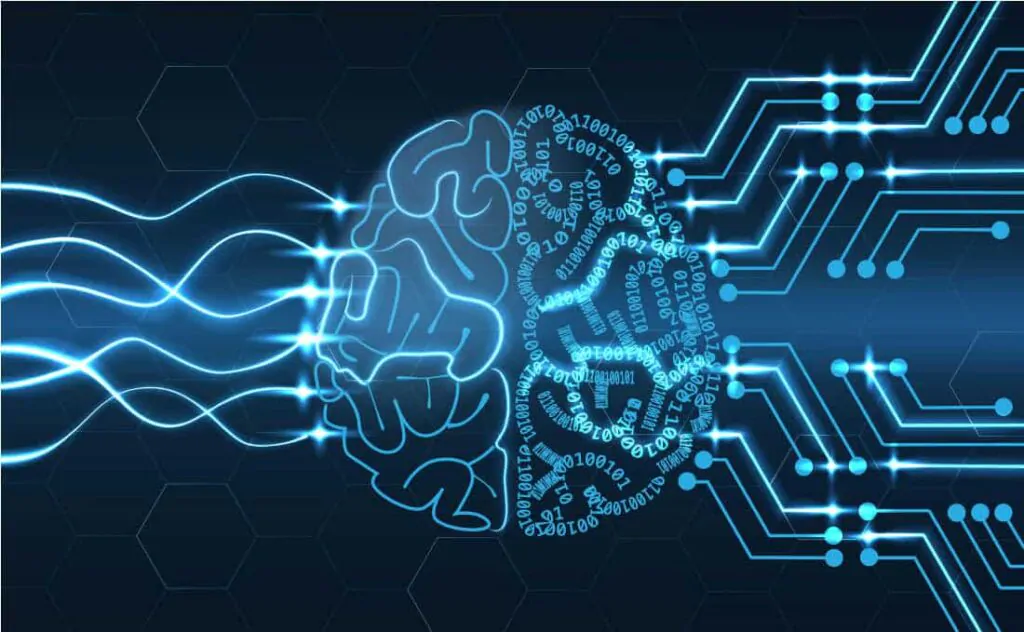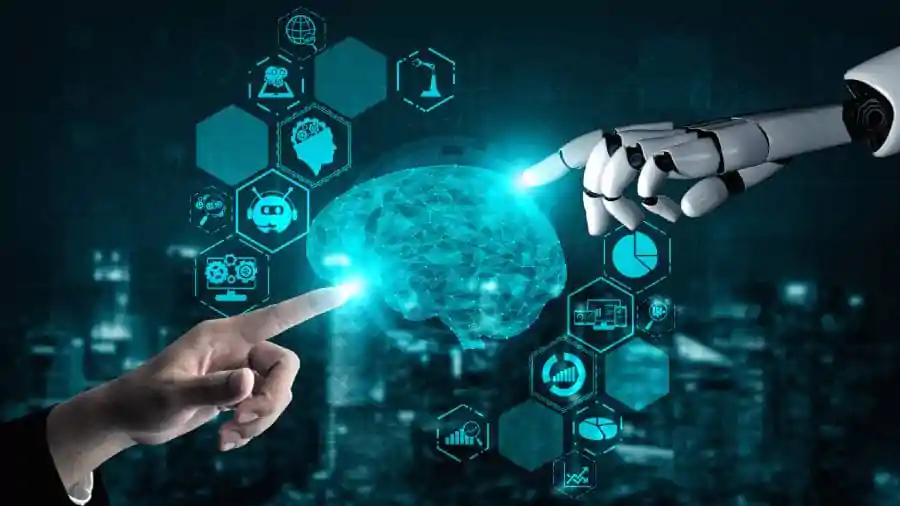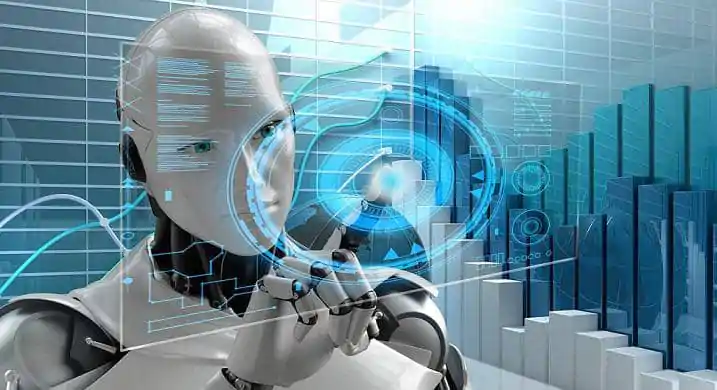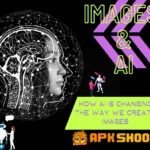The Future of Artificial Technology
In the computer sector, Artificial intelligence (AI) has gained a lot of popularity over the past few years and this is because of good reason. The development of computer science that is capable of carrying out activities that traditionally require human intelligence is known as artificial intelligence or AI. Artificial Intelligence (AI) is the simulation of human intelligence in machines that are codded to think like a human.
Similar to people, these machines are trained to learn lessons from their experiences and adjust to new circumstances. Artificial intelligence (AI) has recently gained popularity as a term in the technology world, with many companies and sectors using it to boost productivity and optimize business processes. Artificial intelligence is the development of intelligent machines that are capable of thinking and acting like humans, and it has the power to change the way we live and work. Machine learning involves formulating algorithms to enable machines to study data and improve their functions with more performance with the passage of time.
AI has a big impact on a lot of different social areas, from healthcare to banking to transportation. It has a huge range of potential applications. artificial intelligence (AI) is changing the way we live, from self-driving cars to virtual assistants. The main purpose of AI is to enable machines to perform tasks that typically require human intelligence, such as learning, reasoning, problem-solving, and perception.
In this article, APKShoot will explore the world of AI, its impact on different industries, and its future prospects.

Define Artificial Intelligence
Artificial Intelligence is a branch of computer science that deals with building intelligent machines that can work and just think like people. These machines are programmed to complete tasks that require human intelligence, such as learning, reasoning, problem-solving, and decision-making. AI is achieved through machine deep learning and natural language processing, which enable machines to learn from experience and improve their performance over time.
The Importance of Artificial Intelligence
The capacity of artificial intelligence to automate operations and increase efficiency is causing its increasing popularity in today’s environment. AI is used in Healthcare, finance, transportation, manufacturing and more sectors. AI is applied to healthcare to identify the cause of illnesses, develop treatment plans, and enhance patient overall outcomes. AI may be applied to finance to evaluate vast volumes of data, spot trends, and make wise financial decisions. AI can be utilized in the transportation industry to streamline routes and ease traffic. AI can be utilized in manufacturing to automate processes and boost output.
How AI is Reshaping the World
1. Healthcare
AI is being used to develop more accurate diagnostic tools and personalized treatments for patients. It is used in the healthcare industry to improve patient outcomes and increase efficiency. It can be employed to examine comprehensive amounts of healthcare data.
For example, AI can analyze medical images to identify patterns that humans may miss, leading to earlier detection of diseases such as cancer.
Overall it is used to improve disease detection, drug development, and personalized medicine.
2. Finance
AI is being used in the finance industry to improve fraud detection, risk assessment, and customer service. AI algorithms can analyze market trends and economic data to identify opportunities for investors and help them make more informed decisions. AI can also help banks and other financial institutions detect fraud and prevent financial crimes.
This has the potential to improve the accuracy of financial predictions and reduce the risk of financial crises. AI-powered chatbots can help customers with their queries, as well as provide them with personalized recommendations. It can also be used to develop investment strategies and make informed investment decisions.
3. Retail
AI is being used in the retail industry to improve customer experience, increase sales, and optimize inventory. AI tools using artificial intelligence can use customer information to give personalized advice and anticipate future trends.
4. Manufacturing
AI is being used in the manufacturing industry to increase product efficiency, reduce manufacturing costs, and improve product quality. AI-powered robots can perform repetitive tasks, analyze data, and make decisions in real time.AI can be used in manufacturing to automate tasks and improve productivity. It can also be used to monitor equipment of the procedure used in manufacturing and predict the engineers if any maintenance needs.
5. Transportation
AI is being used to improve the safety and efficiency of transportation systems. For example, self-driving cars use AI to make decisions about acceleration, braking, and steering, reducing the risk of accidents caused by human error. AI can be used in transportation to optimize routes and reduce congestion. AI can also be used to upgrade safety and reduce the chance of any accidents. Self-driving cars and trucks are being developed using AI, which could reduce accidents and improve transportation efficiency.
6. Education
AI has the potential to transform the method we teach and learn anything. AI-powered educational tools can adapt to individual student’s learning styles and provide personalized feedback to help them improve their performance. For example, AI can analyze a student’s written work to identify areas where they need more practice, or it can provide real-time feedback during online classes to help students stay engaged and focused.
7. Entertainment
AI is being used to create personalized recommendations for movies, TV shows, and music, based on the user’s viewing and listening history.

Benefits of Artificial Intelligence
Improved Efficiency: AI can process large amounts of data in a short amount of time, resulting in improved efficiency and productivity.
1. Increased Accuracy
AI can analyze data with more precision and accuracy than humans, reducing the chances of errors and mistakes.
2. Cost Savings
AI can automate tasks that would otherwise require human labor, resulting in significant cost savings for businesses.
3. Personalization
AI can personalize recommendations and experiences for individual users based on their preferences and behavior.
4. Concerns with Artificial Intelligence
While AI has numerous benefits, there are also concerns about its use. Some of the major concerns include:
5. Job Displacement
AI automation could lead to job losses in various industries, particularly in low-skilled jobs.
6. Bias
AI systems can perpetuate existing biases and prejudices, leading to unfair outcomes.
7. Privacy
AI systems often collect vast amounts of personal data, raising concerns about data privacy and security.
8. Dependence
Over-reliance on AI systems could lead to a loss of critical thinking and decision-making skills.
The Future of AI
As AI continues to evolve, its potential applications will only become vaster. Some experts predict that AI will be used to develop new materials, optimize supply chains, and even detect and prevent natural disasters. However, with this potential comes concerns about the impact of AI on employment and privacy.

Future Prospects of Artificial Intelligence
The future of AI looks bright, with more and more industries adopting it to improve their operations. The following are some of the future prospects of AI
1. Autonomous Vehicles
AI-powered autonomous vehicles are expected to revolutionize the transportation industry, making it safer and more efficient.
2. Personalized Medicine
AI-powered tools can analyze a patient’s DNA and medical history to provide personalized treatment plans.
3. Smart Homes
AI-powered smart homes can learn a homeowner’s preferences and adjust the temperature, lighting, and security accordingly.
4. Cybersecurity
AI-powered tools can detect and prevent cyber threats in real-time, making it easier to protect sensitive information.
Conclusion
AI is already having a significant impact on many different industries, and its potential applications are vast. From healthcare to transportation to education, AI is reshaping the world in many ways. As this technology continues to evolve, it will be important to consider its potential benefits and drawbacks and ensure that its impact is used for the greater good.
AI is rapidly changing the way we live and work, with its impact expected to increase in the future. As technology advances, it’s important to ensure that AI is developed and used responsibly, to maximize its benefits while minimizing its risks. With its potential to improve efficiency, reduce costs, and enhance decision-making, AI is set to transform the world as we know it.
Related Post
- Applications of Artificial Intelligence
- Guide to Deep Learning
- Chatbots Software for Small Businesses
FAQ
Artificial intelligence refers to machine learning that is capable of performing tasks that typically require human intelligence, such as learning, problem-solving, and decision-making.
AI is being used to develop more accurate diagnostic tools and personalized treatments for patients. For example, AI can analyze medical images to identify patterns that humans may miss, leading to earlier detection of diseases such as cancer.
As AI continues to evolve, its potential applications will only become vaster. Some experts predict that AI will be used to develop new materials, optimize supply chains, and even detect and prevent natural disasters.
AI will certainly change the way humans work, but it’s unlikely to take over jobs completely. Instead, AI will likely automate repetitive and mundane tasks, freeing up humans to focus on more creative and complex tasks.
Like any other technology, AI has potential risks and benefits. However, the benefits of AI are expected to outweigh the risks, as long as it’s developed and used responsibly.
AI is planned to increase human intelligence not replace it. While AI can perform certain tasks better than humans, it still lacks the ability to reason and understand complex emotions.










